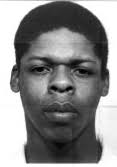James Richardson was executed by the State of Texas for the murder of Gerald Abay
According to court documents James Richardson would enter a liquor store where he would fatally shoot Gerald Abay. Money would be stolen from the cash register before fleeing. Richardson was shot in the hand during the robbery by Abay
James Richardson would be arrested, convicted and sentenced to death
James Richardson would be executed by lethal injection on May 23 2000
James Richardson Photos

James Richardson FAQ
When Was James Richardson Executed
James Richardson was executed on May 23 2000
James Richardson Case
Texas Attorney General John Cornyn offers the following information on James Davis Richardson who is scheduled to be executed after 6 p.m., Tuesday, May 23rd: On the evening of December 17, 1986, Gerald Abay, was found dead on the floor behind the counter of his liquor store in Corsicana, Texas. Abay had been shot in the neck and chest. Over $100,000 and Abay’s .25 caliber pistol, which he kept behind the counter for protection, were taken from the store. The glass in the front doors of the liquor store was shattered, and there was blood on the floor near the front door. A .38 caliber pistol, that Abay was known to carry, was found near his body.
Michael Ellison, James Davis Richardson’s accomplice, testified at trial that on Dec. 17, 1986, he asked James McHenry, another accomplice, if he would take him to a liquor store. McHenry agreed and Richardson went with them. At the liquor store, Ellison and McHenry went inside and Richardson waited in the car. While Ellison was paying for some beer, Richardson entered the store. As McHenry walked out of the store, Richardson suddenly shot Abay in the neck with a .25 caliber pistol. Richardson then shot Abay a second time in the chest. Abay pulled out his .38 caliber pistol and shot at Richardson several times. Abay shot Richardson in the thumb and shattered the glass in the front doors of the liquor store. Ellison took money out of the cash register, as well as Abay’s .25 caliber pistol, which was kept behind the cash register. Ellison testified that Richardson drove the car after the robbery and handed his own .25 caliber pistol to McHenry who put it in the glove compartment.
Don Sullivan, a fingerprint examiner, while en route to the crime scene, saw an abandoned car matching the radio broadcast description of the getaway car. Sullivan approached the car and saw blood on the steering wheel, front door handle, door panel and carpet on the driver’s side. A fingerprint on the front door handle matched Richardson’s fingerprint. A .25 caliber pistol was found in the glove compartment of the getaway car and a thumbprint matching the thumbprint of James McHenry was taken from the pistol. Shortly after the murder a Navarro County sheriff’s deputy arrested Richardson, whose left hand was wounded and wrapped in a bloody towel. The deputy took Richardson to the hospital for treatment and the towel was bagged and sent to the laboratory for analysis. Both McHenry and Ellison gave information leading to the recovery of Abay’s .25 caliber pistol and some money. Dr. Grady Shaw treated Richardson for a gunshot wound to his left hand. Forsenics experts were able to match the blood found on the getaway car to that of Richardson.
Dr. Vincent Matthews, deputy chief medical examiner for Dallas County, determined that Abay’s death was caused by gunshot wounds to the neck and chest. Two .25 caliber bullets were recovered from Abay’s body and were submitted for ballistics testing. Larry Fletcher, a firearms examiner, conducted an examination of the .25 caliber pistol found in the glove compartment of the getaway car and the two .25 caliber bullets taken from Abay’s body. The test rounds fired from the .25 caliber pistol and the bullets taken from Abay’s body were identical and were fired from the same firearm.
http://www.oag.state.tx.us/newspubs/releases/2000/20000522richardson.htm









